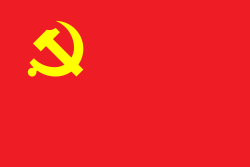You can help expand this article with text translated from the corresponding article in Chinese. (July 2021)Click [show] for important translation instructions.
|
 The flag of the Chinese Communist Party | |
| Date | 12–18 September 1997 (6 days) |
|---|---|
| Location | Great Hall of the People, Beijing, China |
| Participants | 2,048 delegates |
| Outcome | Election of the 15th Central Committee and 15th Central Commission for Discipline Inspection |
The 15th National Congress of the Chinese Communist Party was held in Beijing between September 12 and 18, 1997. It was preceded by the 14th National Congress of the Chinese Communist Party and was followed by the 16th National Congress of the Chinese Communist Party. 2,048 delegates and 60 specially invited delegates represented the party's estimated 59 million members.
Contents
The congress elected a 344-member 15th CCP Central Committee, as well as a 115-member Central Commission for Discipline Inspection (CCDI). This change in membership made the new average age of the CCP 55 and percentage of members holding university or college level education 92.4%. Jiang Zemin was reappointed CCP General Secretary and Chairman of the Central Military Commission.
| 15th National Congress of the Chinese Communist Party | |||||||
|---|---|---|---|---|---|---|---|
| Simplified Chinese | 中国共产党第十五次全国代表大会 | ||||||
| Traditional Chinese | 中國共產黨第十五次全國代表大會 | ||||||
| |||||||
| Abbreviated name | |||||||
| Chinese | 十五大 | ||||||
| |||||||
